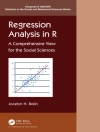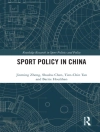Quantile Regression, the first book of Hao and Naiman′s two-book series, establishes the seldom recognized link between inequality studies and quantile regression models. Though separate methodological literature exists for each subject, the authors seek to explore the natural connections between this increasingly sought-after tool and research topics in the social sciences. Quantile regression as a method does not rely on assumptions as restrictive as those for the classical linear regression; though more traditional models such as least squares linear regression are more widely utilized, Hao and Naiman show, in their application of quantile regression to empirical research, how this model yields a more complete understanding of inequality. Inequality is a perennial concern in the social sciences, and recently there has been much research in health inequality as well. Major software packages have also gradually implemented quantile regression. Quantile Regression will be of interest not only to the traditional social science market but other markets such as the health and public health related disciplines.
Key Features:
Inhoudsopgave
Series Editor′s Introduction
Acknowledgments
1. Introduction
2. Quantiles and Quantile Functions
3. Quantile-Regression Model and Estimation
4. Quantile Regression Inference
5. Interpretation of Quantile-Regression Estimates
6. Interpretation of Monotone-Transformed QRM
7. Application to Income Inequality in 1991 and 2001
Appendix: Stata Codes
References
Index
About the Authors
Over de auteur
Daniel Q. Naiman (Ph D, Mathematics, 1982, University of Illinois at Urbana-Champaign) is Professor and Chair of the Applied Mathematics and Statistics at the Johns Hopkins University. He was elected as a Fellow of the Institute of Mathematical Statistics in 1997, and was an Erskine Fellow at the University of Canterbury in 2005. Much of his mathematical research has been focused on geometric and computational methods for multiple testing. He has collaborated on papers applying statistics in a variety of areas: bioinformatics, econometrics, environmental health, genetics, hydrology, and microbiology. His articles have appeared in various journals including Annals of Statistics, Bioinformatics, Biometrika, Human Heredity, Journal of Multivariate Analysis, Journal of the American Statistical Association, and Science.












